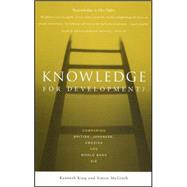
What is included with this book?
| Acknowledgements | vii | ||||
| List of abbreviations and acronyms | ix | ||||
| 1 Researching knowledge-based aid | 1 | (17) | |||
|
1 | (2) | |||
|
3 | (1) | |||
|
3 | (12) | |||
|
15 | (3) | |||
| 2 The new aid agenda | 18 | (14) | |||
|
18 | (7) | |||
|
25 | (7) | |||
| 3 Knowledge for development | 32 | (23) | |||
|
32 | (5) | |||
|
37 | (12) | |||
|
49 | (3) | |||
|
52 | (3) | |||
| 4 The World Bank or the knowledge bank? | 55 | (44) | |||
|
55 | (1) | |||
|
56 | (2) | |||
|
58 | (7) | |||
|
65 | (5) | |||
|
70 | (20) | |||
|
90 | (9) | |||
| 5 From information management to knowledge sharing: DFID's unfinished revolution | 99 | (31) | |||
|
99 | (10) | |||
|
109 | (9) | |||
|
118 | (3) | |||
|
121 | (2) | |||
|
123 | (7) | |||
| 6 Knowledge, learning and capacity in the Swedish approach to development cooperation | 130 | (25) | |||
|
|||||
|
133 | (10) | |||
|
143 | (2) | |||
|
145 | (2) | |||
|
147 | (5) | |||
|
152 | (3) | |||
| 7 Experience, experts and knowledge in Japanese aid policy and practice | 155 | (41) | |||
|
156 | (7) | |||
|
163 | (7) | |||
|
170 | (3) | |||
|
173 | (3) | |||
|
176 | (10) | |||
|
186 | (3) | |||
|
189 | (7) | |||
| 8 Conclusions and implications for knowledge, aid and development | 196 | (17) | |||
|
196 | (1) | |||
|
197 | (11) | |||
|
208 | (1) | |||
|
209 | (4) | |||
| Bibliography | 213 | (17) | |||
| Index | 230 |
The New copy of this book will include any supplemental materials advertised. Please check the title of the book to determine if it should include any access cards, study guides, lab manuals, CDs, etc.
The Used, Rental and eBook copies of this book are not guaranteed to include any supplemental materials. Typically, only the book itself is included. This is true even if the title states it includes any access cards, study guides, lab manuals, CDs, etc.